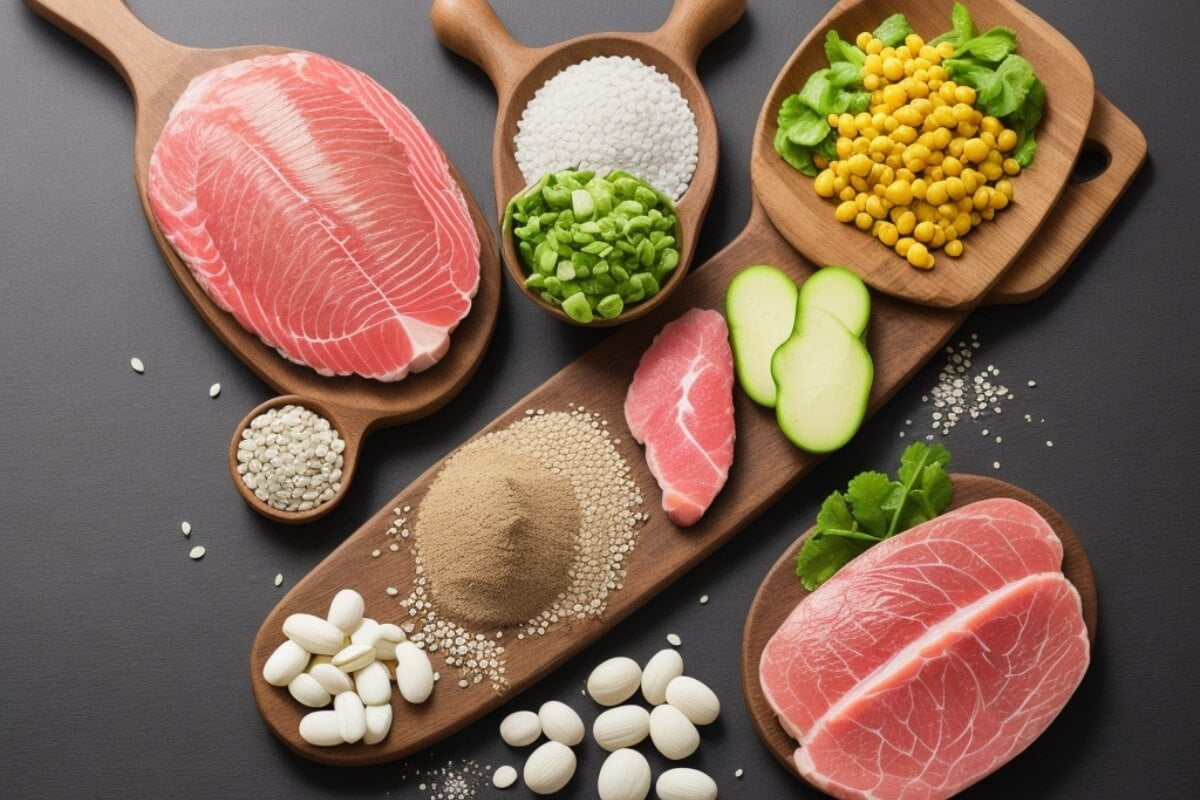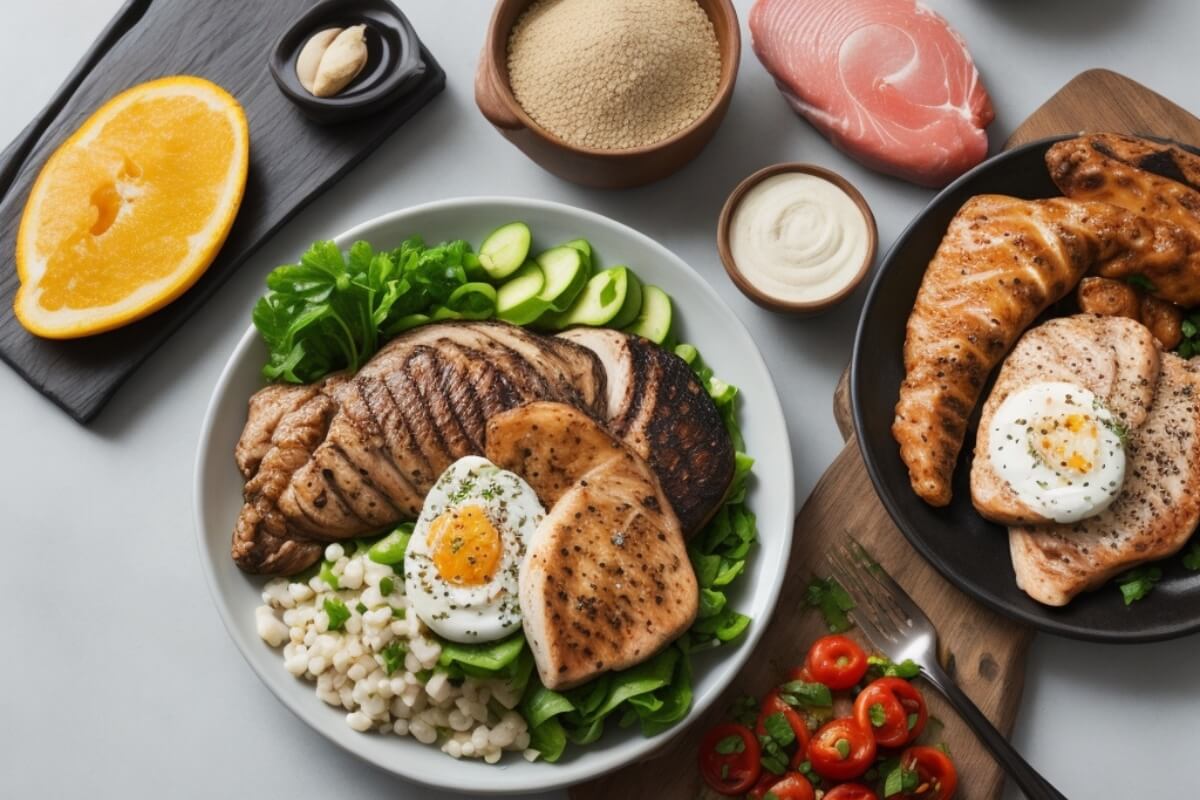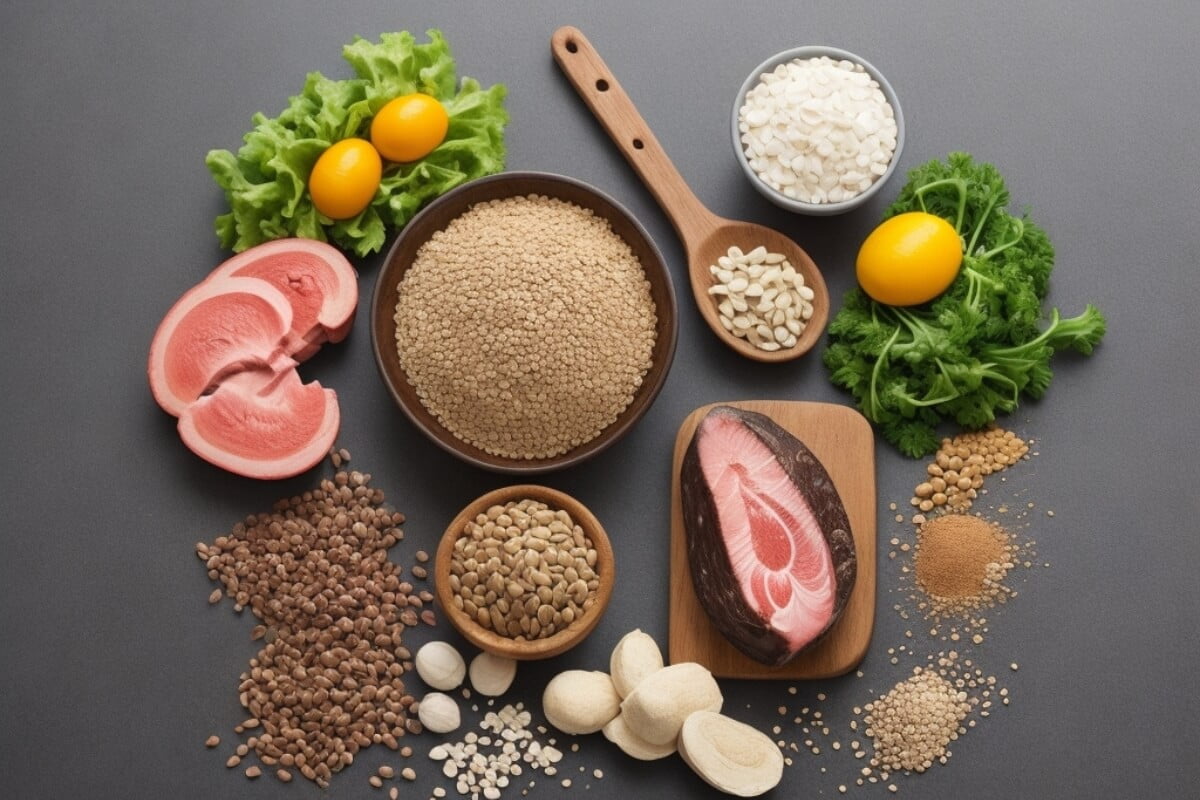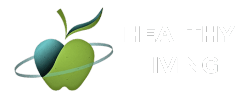Protein is an essential nutrient that plays a key role in many aspects of health. It helps build and repair tissues, supports muscle growth and strength, regulates metabolism and appetite, and provides energy. But how much protein should you eat to lose weight? And what are the best sources of protein for your diet? In this article, we will answer these questions and more, giving you some practical tips on how to optimize your protein intake for weight loss.
Why Protein Matters for Weight Loss
Protein is often referred to as the king of nutrients when it comes to weight loss. And for good reasons. Here are some of the benefits of eating more protein for weight loss:
- Protein increases satiety. Protein is the most filling of the three macronutrients (protein, carbs, and fat). It helps you feel full and satisfied with less food, reducing your calorie intake and preventing overeating. This is partly because protein reduces the levels of ghrelin, the hunger hormone, and increases the levels of peptide YY, a hormone that makes you feel full 1.
- Protein boosts metabolism. Protein has a higher thermic effect than carbs and fat, meaning that your body burns more calories to digest and metabolize it. Protein also helps preserve lean muscle mass, which is the main driver of your resting metabolic rate (the calories you burn at rest). By eating more protein, you can increase your metabolism and burn more calories throughout the day 2.
- Protein prevents muscle loss. When you lose weight, you don’t just lose fat, but also some muscle. This can slow down your metabolism and make you look flabby. However, by eating enough protein, especially in combination with resistance training, you can prevent or minimize muscle loss and maintain a toned and fit physique 3.
How Much Protein Should You Eat to Lose Weight?
The amount of protein you need depends on several factors, such as your age, weight, activity level, and goals. The recommended dietary allowance (RDA) for protein is 0.8 grams per kilogram of body weight per day. This is the minimum amount you need to prevent deficiency and maintain normal body functions. However, this may not be enough for optimal health and weight loss. Many studies suggest that a higher protein intake, ranging from 1.2 to 2.0 grams per kilogram of body weight per day, may be more beneficial for weight loss and metabolic health 45. For example, if you weigh 70 kg (154 lbs), you may need between 84 and 140 grams of protein per day. To put this into perspective, one large egg contains about 6 grams of protein, and one chicken breast contains about 27 grams of protein. Of course, these are general guidelines, and you may need to adjust your protein intake based on your individual needs and preferences. You can use our protein calculator to estimate your daily protein requirement based on your specific body and lifestyle.
What Are the Best Sources of Protein for Weight Loss?

You can get protein from both animal and plant sources. However, not all protein sources are created equal. Some are more complete, meaning that they contain all nine essential amino acids that your body cannot produce and must get from food. Some are also more digestible, bioavailable, and nutritious than others. Here are some of the best sources of protein for weight loss:
- Lean meats. Lean meats, such as chicken, turkey, lean beef, and pork, are high in protein and low in fat. They also provide iron, zinc, and B vitamins, which are important for energy production and metabolism. Lean meats can help you build and maintain muscle mass, boost your metabolism, and keep you full for longer. However, you should limit your intake of processed meats, such as bacon, sausage, and ham, as they are high in sodium, saturated fat, and preservatives, and may increase your risk of chronic diseases 6.
- Seafood. Seafood, such as fish, shellfish, and seaweed, are excellent sources of protein and omega-3 fatty acids, which have anti-inflammatory and heart-protective effects. Seafood can also provide iodine, selenium, and vitamin D, which are essential for thyroid function and bone health. Seafood can help you lose weight by improving your insulin sensitivity, reducing your appetite, and enhancing your mood 7. However, you should avoid seafood that is high in mercury, such as shark, swordfish, and king mackerel, as they can harm your nervous system and brain 8.
- Eggs. Eggs are one of the most complete and versatile sources of protein. They contain all nine essential amino acids, as well as choline, a nutrient that supports brain and liver health. Eggs can help you lose weight by increasing your satiety, boosting your metabolism, and preserving your muscle mass 9. Contrary to popular belief, eggs do not raise your blood cholesterol levels or increase your risk of heart disease 10. However, you should choose organic, free-range, or pasture-raised eggs, as they are more nutritious and humane than conventional eggs 11.
- Dairy products. Dairy products, such as milk, yogurt, cheese, and cottage cheese, are rich in protein and calcium, which are important for bone health and muscle function. Dairy products can also provide probiotics, which are beneficial bacteria that improve your gut health and immunity. Dairy products can help you lose weight by enhancing your thermogenesis, reducing your hunger, and increasing your fat loss . However, you should opt for low-fat or fat-free dairy products, as they are lower in calories and saturated fat than full-fat dairy products .
- Soy. Soy is one of the few plant sources of complete protein. It also contains phytoestrogens, which are plant compounds that mimic the effects of estrogen in the body. Soy can help you lose weight by improving your lipid profile, lowering your blood pressure, and reducing your inflammation . However, you should choose organic, non-GMO, and minimally processed soy products, such as tofu, tempeh, edamame, and soy milk, as they are more natural and nutritious than highly processed soy products, such as soy protein isolate, soy burgers, and soy cheese .
- Quinoa. Quinoa is a pseudocereal that is gluten-free and high in protein, fiber, and antioxidants. It also contains all nine essential amino acids, making it a complete protein source. Quinoa can help you lose weight by increasing your fullness, lowering your blood sugar levels, and modulating your gut microbiota . However, you should rinse quinoa before cooking, as it has a natural coating of saponins, which are bitter compounds that can interfere with nutrient absorption and cause digestive issues .
- Nuts and seeds. Nuts and seeds are high in protein, healthy fats, fiber, and minerals, such as magnesium, zinc, and selenium. They also contain phytochemicals, such as flavonoids, phenolic acids, and phytosterols, which have antioxidant and anti-inflammatory properties. Nuts and seeds can help you lose weight by reducing your appetite, increasing your metabolism, and improving your cholesterol levels . However, you should consume them in moderation, as they are high in calories and can cause allergic reactions in some people .
- Beans and lentils. Beans and lentils are high in protein, fiber, and resistant starch, which are types of carbohydrates that resist digestion and feed the beneficial bacteria in your gut. They also provide folate, iron, and potassium, which are essential for blood formation and pressure regulation. Beans and lentils can help you lose weight by enhancing your satiety, lowering your glycemic response, and regulating your hormones . However, you should soak, sprout, or cook beans and lentils before eating, as they contain antinutrients, such as phytates and lectins, which can impair nutrient absorption and cause digestive issues .
How to Optimize Your Protein Intake for Weight Loss

Eating more protein is not enough to lose weight. You also need to consider other factors, such as your calorie intake, your carb and fat intake, your meal timing, and your exercise routine. Here are some tips on how to optimize your protein intake for weight loss:
- Calculate your protein needs. Use our protein calculator to estimate your daily protein requirement based on your specific body and lifestyle. Aim for the higher end of the range if you are very active, trying to gain muscle, or recovering from an injury. Aim for the lower end of the range if you are sedentary, have kidney or liver problems, or are pregnant or breastfeeding.
- Track your protein intake. Use a food diary, an app, or a website to track your protein intake and make sure you are meeting your goals. You can also use a food scale, a measuring cup, or your hand to estimate your portion sizes and protein content. For example, a palm-sized piece of meat or fish contains about 20 to 25 grams of protein, and a fist-sized amount of cooked beans or lentils contains about 15 grams of protein.
- Choose high-quality protein sources. As mentioned above, not all protein sources are equal. Choose protein sources that are complete, digestible, bioavailable, and nutritious, and avoid protein sources that are incomplete, indigestible, low-quality, or unhealthy. Also, vary your protein sources to get a wide range of amino acids and nutrients, and include both animal and plant sources of protein in your diet.
- Spread your protein intake throughout the day. Many people tend to eat most of their protein at dinner
- Spread your protein intake throughout the day. Many people tend to eat most of their protein at dinner, but this may not be the best strategy for weight loss. Research shows that eating protein evenly across your meals can improve your muscle protein synthesis, appetite control, and metabolic health . Aim for at least 20 to 30 grams of protein per meal, and include some protein in your snacks as well.
- Combine protein with other macronutrients. Protein is important, but it is not the only macronutrient that matters for weight loss. You also need to balance your protein intake with your carb and fat intake, as they affect your energy levels, blood sugar levels, and hormone levels. A general rule of thumb is to follow a moderate-carb, moderate-fat, high-protein diet, which has been shown to be effective for weight loss and health . However, you may need to adjust your macronutrient ratio based on your individual needs and preferences. You can use our macronutrient calculator to find out your optimal macronutrient ratio for weight loss.
- Time your protein intake around your workouts. Protein is especially important before and after your workouts, as it helps fuel your muscles, prevent muscle breakdown, and enhance muscle recovery and growth. Studies suggest that consuming 20 to 40 grams of protein within one to two hours before and after your workouts can maximize your muscle protein synthesis and improve your exercise performance and adaptation . You can choose from a variety of protein sources, such as whey protein, casein protein, soy protein, or a protein-rich meal or snack, depending on your availability, convenience, and tolerance.
- Drink enough water. Water is essential for your health and weight loss, as it helps transport nutrients, flush out toxins, regulate body temperature, and maintain hydration. Water also helps dilute the concentration of urea, a waste product of protein metabolism, and prevent kidney damage and dehydration. You should drink at least 2 to 3 liters of water per day, and more if you exercise, sweat, or live in a hot or dry climate. You can also drink other fluids, such as tea, coffee, or juice, but avoid sugary drinks, alcohol, and soda, as they can add extra calories and dehydrate you.
Common Questions About Protein and Weight Loss

Here are some of the most common questions that people have about protein and weight loss, and their answers:
- Can I eat too much protein? Eating too much protein is unlikely to harm your health or weight loss, unless you have a medical condition that affects your protein metabolism, such as kidney or liver disease. However, eating more protein than you need may not provide any additional benefits, and may displace other important nutrients from your diet. Therefore, you should aim for a moderate and balanced protein intake that meets your needs and goals, and not exceed the upper limit of 2.0 grams per kilogram of body weight per day .
- What are the best protein powders for weight loss? Protein powders are convenient and effective ways to increase your protein intake, especially if you have a busy schedule, a low appetite, or a high protein requirement. However, not all protein powders are the same, and some may contain added sugars, artificial sweeteners, or other additives that can sabotage your weight loss. The best protein powders for weight loss are those that are pure, natural, and high-quality, and that suit your taste, budget, and dietary preferences. Some of the most popular and researched protein powders for weight loss are whey protein, casein protein, soy protein, pea protein, and rice protein .
- How does protein affect ketosis? Ketosis is a metabolic state where your body burns fat instead of carbs for energy, which can help you lose weight and improve your health. To enter and maintain ketosis, you need to follow a very low-carb, high-fat, moderate-protein diet, also known as the ketogenic diet. Protein can affect ketosis in two ways: too little protein can cause muscle loss and impair your metabolism, while too much protein can prevent ketosis and increase your blood sugar levels. The optimal protein intake for ketosis varies from person to person, but a general recommendation is to consume 0.6 to 1.0 grams of protein per kilogram of body weight per day .
Conclusion
Protein is a vital nutrient that can help you lose weight and improve your health. By following the tips and guidelines in this article, you can optimize your protein intake for weight loss and enjoy the benefits of eating more protein. Remember, protein is not a magic bullet, and you still need to follow a healthy, balanced, and calorie-controlled diet, and exercise regularly, to achieve your weight loss goals. If you have any questions or comments, please feel free to leave them below. We would love to hear from you!
Follow our social networks facebook, pinterest and see more tips
